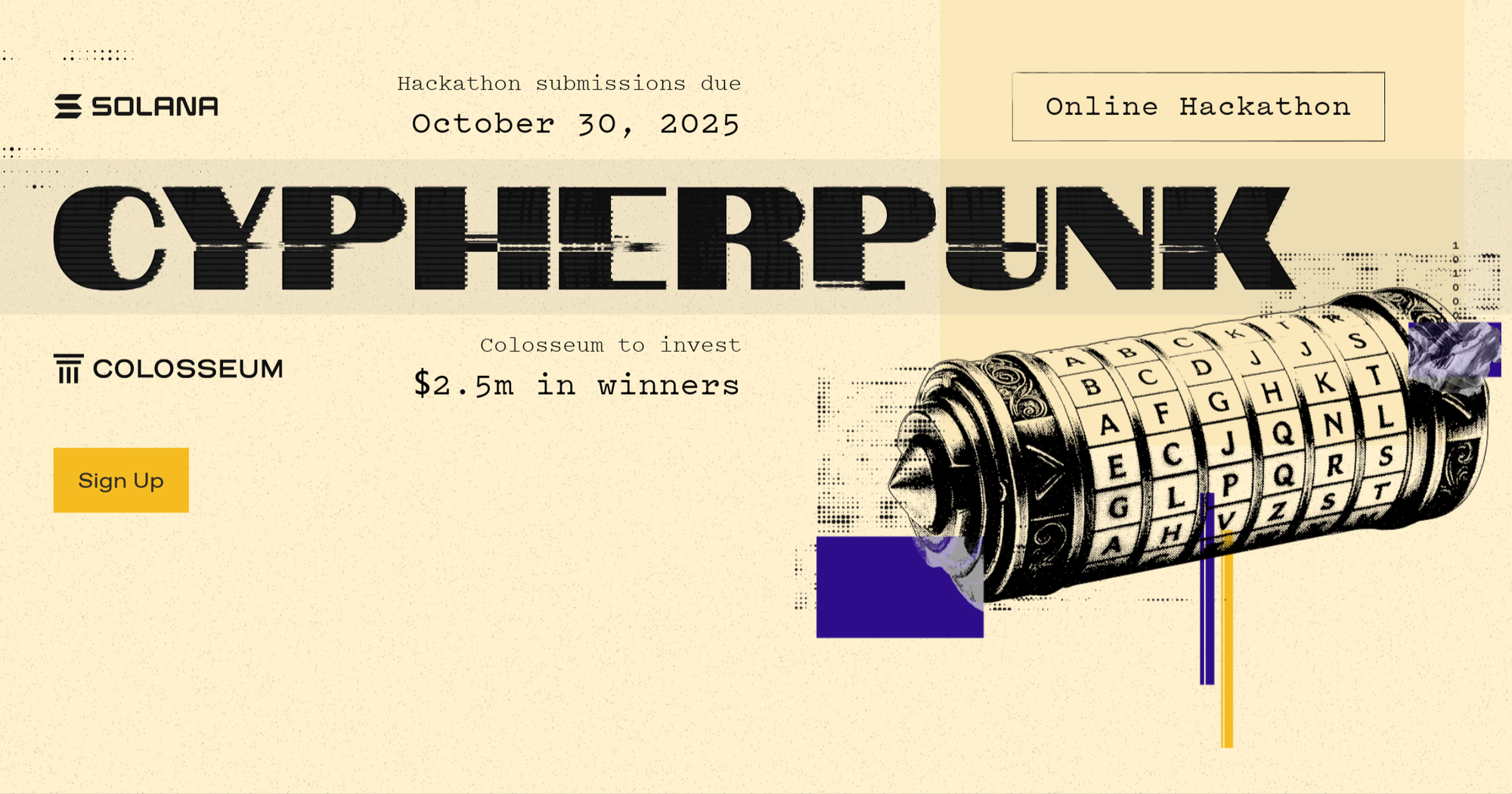Colosseum Codex: Cypherpunk Hackathon, Alpenglow Approved, MagicBlock TEE Ephemeral Rollups
Cypherpunk Hackathon, Solana validators approve Alpenglow, MagicBlock TEE-secured Ephemeral Rollups, Dev.fun Projects, CU Optimization

Here's what's featured in this week's issue:
- Colosseum has shared the next Solana Hackathon: Cypherpunk
- Solana validators pass Alpenglow consensus upgrade
- MagicBlock launches TEE-secured Ephemeral Rollups
- Dev.fun introduces Projects
- Top Ledger report on optimizing Compute Units
🏆 Cypherpunk Hackathon
Colosseum has announced that the next global Solana hackathon, Cypherpunk, will begin on September 25, 2025, and registrations are now open.

Colosseum has committed $2.5 million in prizes and investments for winners. Tracks, sponsors, prizes, and updates will be shared before the Cypherpunk Hackathon officially kicks off.
🌄 Alpenglow Approved
The Solana validator community has overwhelmingly approved SIMD-0326, the Alpenglow consensus upgrade, with over 98% of participating stake voting in favor.
Alpenglow marks the most significant architectural shift in Solana’s history, replacing Proof-of-History and TowerBFT with a new model built around Votor, an off-chain vote aggregation system, and Rotor, a new block propagation mechanism.
Together, these innovations aim to cut transaction finality from ~12.8 seconds to 100–150 milliseconds, while simplifying consensus, reducing ledger bloat, and boosting network resilience.
It also changes validator economics by introducing a Validator Admission Ticket (1.6 SOL per epoch) in place of per-slot vote fees, while enhancing leader rewards for vote aggregation and finalization services.
Validators and core developers will now focus on the technical implementation and deployment timeline, ensuring a smooth transition to the new consensus, setting the stage for Solana’s next phase of performance and developer adoption.
Solana validators approve Alpenglow upgrade
🤫 MagicBlock TEE-secured Ephemeral Rollups
MagicBlock has launched the first TEE-secured Ephemeral Rollups on Solana, delivering institutional-grade privacy with sub-50ms execution while preserving full composability.
Built on Intel TDX enclaves, the system shields sensitive computations in a hardware-verified “black box,” enabling developers to build private order books, regulatory-compliant DeFi, corporate payment rails, and consumer apps with hidden state, all without bridges, rewrites, or performance trade-offs.
Your @SolanaMobile Seeker now supports private Solana transactions
— MagicBlock ⬛️ (@magicblock) September 4, 2025
Our Rust Engineer Julien walks you through how to use our Private Payments Demo
Demo link in second tweet 👇 pic.twitter.com/8DfKbBym5x
TEE-secured Ephemeral Rollups are available now via the MagicBlock platform. Developers can access integration guides, code examples, and a demo app.
MagicBlock Brings Institutional-Grade Privacy to Solana in Industry First
📣 Dev.fun Projects
Dev.fun has announced Projects, a new framework for building and trading viral onchain apps, evolving beyond meme trading into a platform for launching products, raising capital, and enabling collaboration.
Projects will roll out in three phases:
- Launch of Projects and a new UI
- Expanded tools for building and collaboration
- A new way to launch on pump.fun
To kick things off, dev.fun opened applications for its first Projects Cohort, giving a select group of builders early access to features, including the new pump ICO launch mechanism.
🧾 Compute Unit Optimization
This article from Top Ledger breaks down one of the most important and misunderstood aspects of Solana’s performance: Compute Units (CUs).
It explains how CUs function as the fuel for every transaction, how allocation differs from consumption, and why over-allocation leads to significant ecosystem-wide costs.
The piece highlights recent protocol changes, including reduced default CU allocations, expanded block capacity, and the upcoming SIMD-0286 proposal to raise per-block limits to 100M.
For developers, CU optimization is no longer optional.
From deserialization overhead at entrypoints to setting efficient compute limits and prices, wasted units directly translate to higher costs for users and protocol treasuries. Careful CU management improves not only app performance, but also overall chain health.
Compute Units: What they mean, How they’re priced, and Why optimization matters
⚡ Quick Hits
Some thoughts on SIMD-0341: v0 Account Compression - @L0STE_
Blueshift adds Testing with LiteSVM 101 Course - Blueshift
Understanding zkCompression on Solana: A Deep Technical Explanation - @_cxalem
Using @solana/kit in React with Wallet Standard - Pratik
Guaranteed Solana TX Inclusion with Raiku (video) - Solfate
Introducing Solana Incubator Cohort 3 - @incubator
The Need of Decentralised EV Infrastructure - @DeCharge__
Building a backend agent with Coinbase Dev Server Wallets - @heimlabs
August on Solana, by the numbers - @solana
⚙️ Tools & Resources
Learn-Solana-BPF-Assembly is a a Solana BPF Assembly learning resource to guide developers in writing low-level Solana programs in Assembly.
Solana-gRPC_indexer-Rust is CLI tool for real-time Solana blockchain monitoring, account tracking, and data indexing with advanced caching and gRPC streaming capabilities.
doppler is an ultra-optimized oracle program for Solana, achieving unparalleled performance at just 21 CUs per update, built with low-level optimizations and minimal overhead.
mpl-core-examples is an Anchor program showcasing how to use Metaplex Core, focusing on real-world workflows with Assets, Collections, and Plugins, that covers creation, customization, and lifecycle operations.
Solana_Static_Analyzer is a powerful static analysis tool for Solana smart contracts written in Rust to detect vulnerabilities, security issues, and code quality problems in your Solana/Anchor projects.
💸 Funding
Reflect Money, winner of Colosseum’s 2024 Radar hackathon, raised $3.75M led by a16z crypto’s CSX with participation from Colosseum, Solana Ventures, Equilibrium, and others. The funding will accelerate development of USDC+, a non-custodial yield-bearing stablecoin on Solana designed to turn idle USDC into productive onchain strategies.
👩🔧 Get Hired
- Squads is hiring a Solana Platform Engineer
- Exponent is hiring a Senior Rust Smart Contract Engineer
- Solana Labs is hiring a Senior Protocol Engineer
- QuickNode is hiring a Technical Operations Engineer, Rollups
- Phantom is hiring a Staff Software Engineer, Backend
📅 Event Calendar
Startup Village Seoul, Seoul, South Korea, Sept 14-20
Startup Village is a week-long bootcamp designed to prepare teams for the next Solana global hackathon. Participants will get hands-on mentorship, hackathon prep, and demo-day pitch practice, all focused on building winning products.
🎧 Listen to This
11AM w/ Seed Club
Matty Taylor, co-founder of Colosseum, shares how Colosseum is reshaping the hackathon landscape by removing bounties and focusing on sustainable startup development rather than ephemeral projects.
Matty also dives deep into Futarchy, a market-based governance framework that could transform decision-making in both early-stage startups and mature organizations by aligning incentives through market mechanisms rather than traditional token voting.
The origins of Colosseum, how it's hackathons work, futarchy, and more!
Follow @mikehale on X or Warpcast!
Thanks for reading ✌️
I hope you found something useful here! If you have any suggestions or feedback just let me know what you think.




